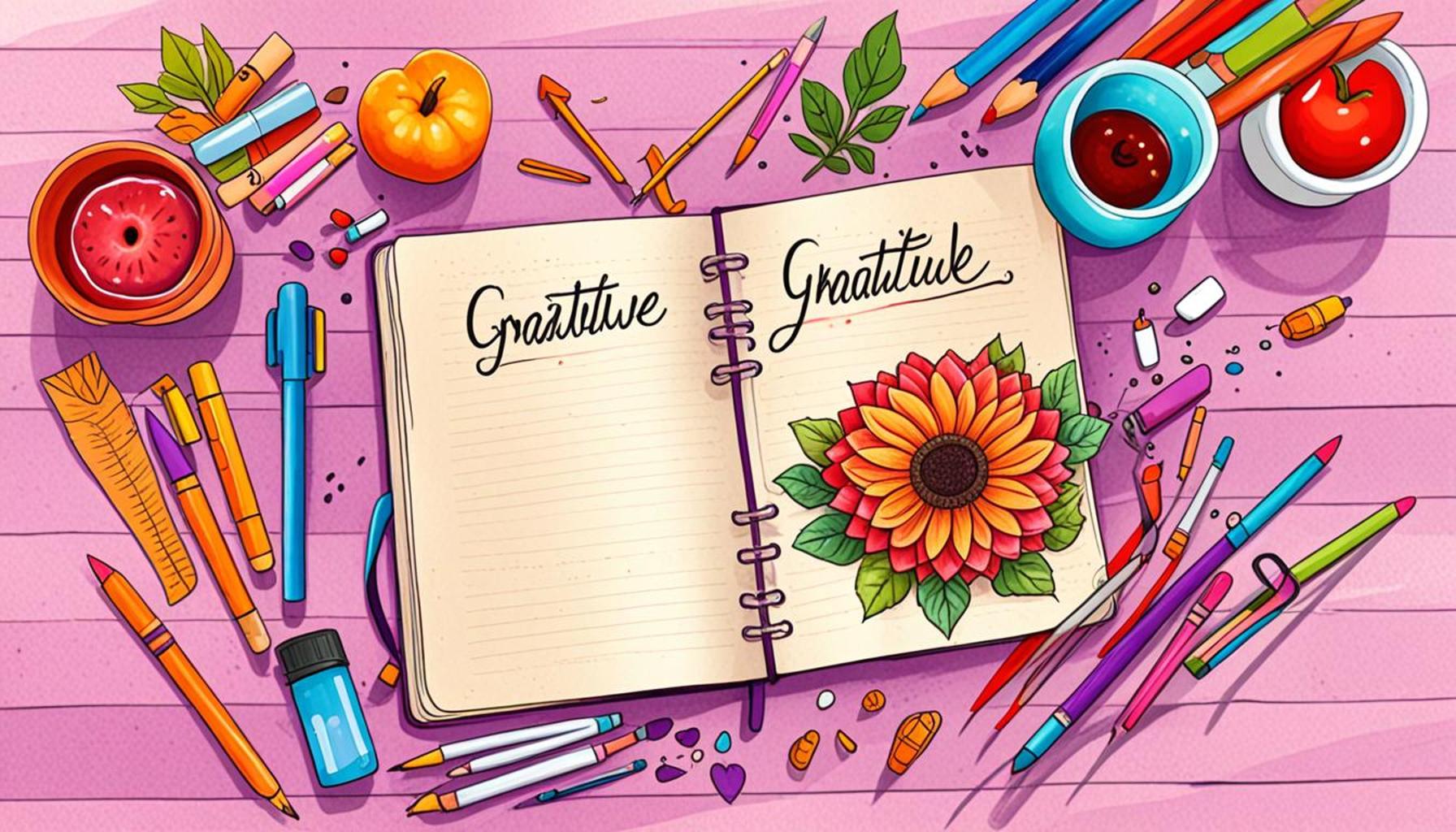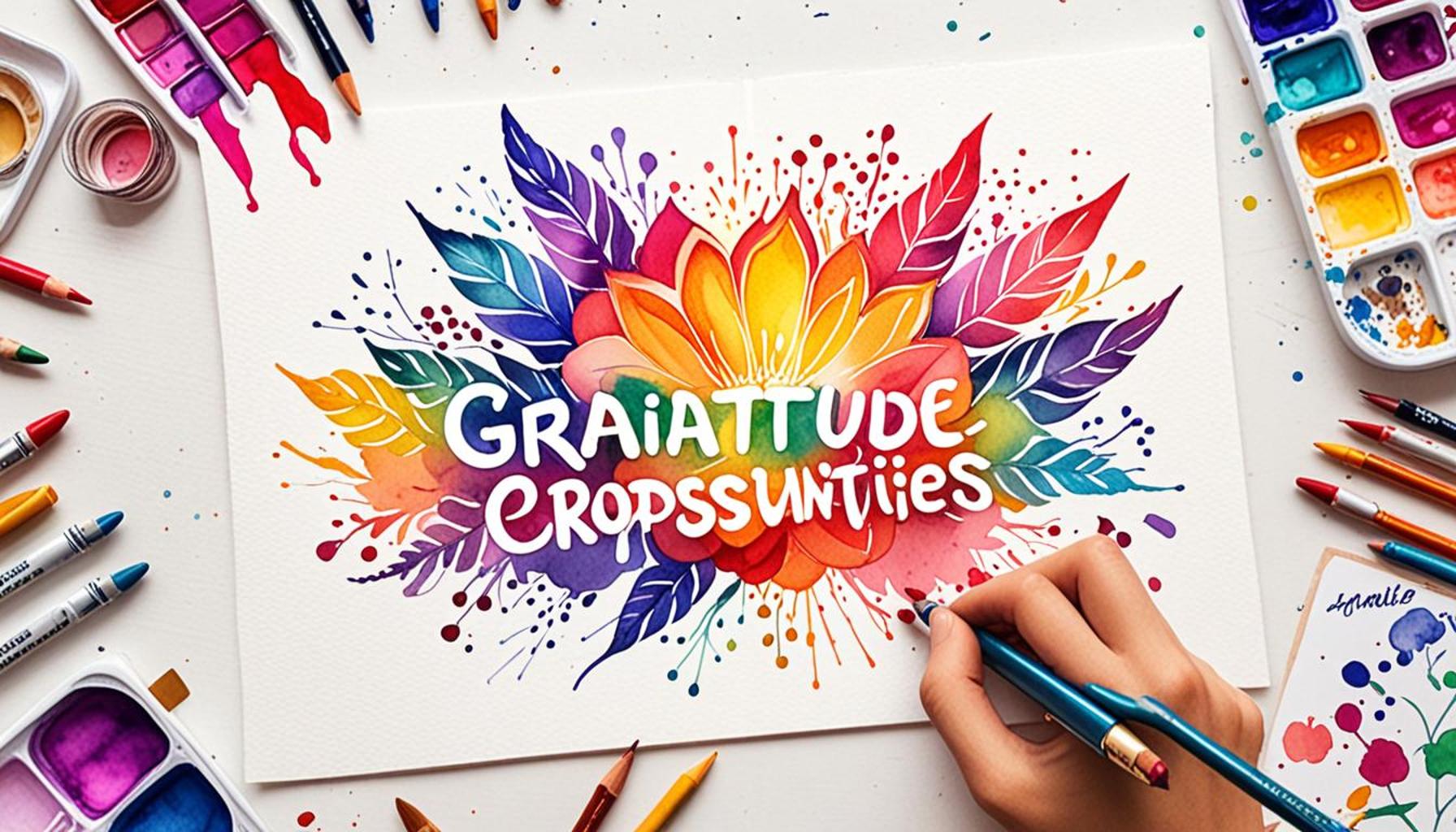Gratitude in Practice: Creating a Gratitude Journal to Transform Your Daily Life

Embracing the Practice of Gratitude
In today’s fast-paced world, it’s easy to overlook the simple joys in life. A gratitude journal offers a powerful way to reconnect with the positive aspects of our daily experiences, promoting a sense of well-being and mindfulness. This effective practice encourages individuals to regularly acknowledge and reflect on what they are thankful for, creating a habit of positivity amidst the chaos of everyday life.
Why should you consider starting a gratitude journal? Here are some compelling reasons:
- Boost Mental Health: Numerous studies indicate that writing down what you’re thankful for can significantly reduce stress and enhance overall mood. This practice can lead to lower levels of anxiety, as it shifts the focus away from negative thoughts and brings attention to positive experiences.
- Enhance Self-Awareness: Reflecting on your experiences fosters deeper introspection and personal growth. As you document your thoughts, you begin to uncover patterns in your own thinking and behavior, leading to greater self-understanding and an appreciation for your life’s journey.
- Build Resilience: Focusing on gratitude can help you navigate life’s challenges more effectively. By regularly acknowledging the good, individuals are better equipped to deal with difficulties, viewing them through a lens of appreciation, which can make hardships more manageable.
In many Nigerian cultures, expressions of gratitude are deeply rooted in social traditions. For example, during festive seasons like Eid and Christmas, families come together not only to celebrate but also to express their thankfulness through prayers and shared meals. Such gatherings foster a sense of belonging and highlight the importance of appreciation in relationships. This communal approach reinforces the notion that gratitude is a collective experience, one that nurtures community bonds.
However, creating a gratitude journal is more than just a cultural exercise; it’s a tangible practice that can transform your daily life through consistent reflection and focus. For instance, dedicating just five to ten minutes daily to jot down a few things you’re grateful for can cultivate a mindset of appreciation. Whether it’s the kindness of a stranger, a delicious meal, or a moment of laughter with friends, documenting these experiences can lead to improved relationships and a richer, more fulfilling life.
Moreover, studies have shown that gratitude journaling can lead to better sleep, enhanced empathy, and reduced aggression. The act of writing itself becomes a ritual that promotes mindfulness, anchoring individuals in the present moment.

In this article, we will explore how to get started with your own gratitude journal and the profound impact it can have on your mental and emotional health. With simple guidelines and tips, you’ll discover how this practice can be seamlessly integrated into your life. Are you ready to embrace a more grateful lifestyle?
RECOMMENDED: Check out this similar article
The Mechanics of Starting Your Gratitude Journal
Embarking on the journey of maintaining a gratitude journal is both simple and rewarding. Whether you are a seasoned writer or someone who rarely puts pen to paper, the beauty of this practice lies in its accessibility and adaptability. Here are some essential steps to help you begin this transformative habit:
- Choose Your Medium: The first step is deciding how you wish to document your gratitude. Some prefer a classic pen-and-paper journal, relishing the tactile experience of writing. Others may opt for digital platforms like note-taking apps or blogs, which offer convenience and flexibility. Choose what resonates most with you.
- Set a Regular Time: Consistency is key in cultivating a successful gratitude practice. Consider setting aside a specific time each day—whether it’s in the morning to start your day with positivity or at night as a reflective exercise. The goal is to make this a habit that integrates seamlessly into your routine.
- Start Small: When you’re just starting, don’t overwhelm yourself with lengthy entries. Aim for a few lines or bullet points that capture the essence of your gratitude. As you grow more comfortable, you can expand your reflections, diving deeper into your thoughts and feelings.
- Focus on Specificity: To maximize the benefits of your journal, be specific about what you’re grateful for. Instead of generic statements, try to articulate why a particular experience or person brings you joy. For example, instead of writing “I’m thankful for my family,” you might express, “I’m grateful for my sister’s encouragement during a tough week.” This approach enhances emotional resonance and reinforces the gratitude you feel.
- Incorporate Reflection: Beyond listing what you are thankful for, use your journal as a space to reflect on what these experiences mean to you. How do they influence your daily life or relationships? What lessons have you learned? This added layer of introspection can significantly deepen your practice.
In corporate settings and even educational environments in Nigeria, gratitude practices are slowly being recognized for their positive effects on team dynamics and emotional well-being. Initiatives like team gratitude boards or end-of-the-day reflections promote a culture of appreciation, reminding employees and students alike of the importance of mutual respect and gratitude. By incorporating these practices into your daily life, you not only pave the way for personal growth but also contribute to a more appreciative community.
Ultimately, maintaining a gratitude journal is a personal endeavor that encourages self-discovery and growth. It acts as a canvas where you can express your evolving thoughts and feelings, allowing you to track your journey through life’s ups and downs. With each entry, you are crafting a narrative filled with positivity, rediscovery, and resilience—a narrative that could significantly transform your overall mindset.
In the next sections, we will delve deeper into the emotional and psychological benefits of gratitude journaling, highlighting real-life experiences and additional techniques to enrich your practice. Are you prepared to discover how this deceptively simple practice holds the keys to a more fulfilling life?
Exploring the Benefits of a Gratitude Journal
Creating a gratitude journal is not merely a trend; it is an effective practice that can deeply enrich your life. Through regular documentation of things you appreciate, this transformative habit enables individuals to foster a more positive outlook. But what specific advantages does a gratitude journal offer?
| Category 1 | Category 2 |
|---|---|
| Emotional Wellbeing | Gratitude journals contribute to a noticeable decrease in feelings of anxiety and depression. |
| Enhanced Relationships | The act of expressing appreciation strengthens connections with family and friends, fostering a supportive network. |
The practice of regularly jotting down what you are thankful for cultivates an overall more satisfying life. It can increase your emotional resilience and improve your mental health over time. Moreover, many individuals find themselves becoming more aware of the positives in their lives, thus leading to a more robust sense of fulfillment. The ripple effects of these advantages often extend to relationships, encouraging stronger bonds as you foster appreciation not just towards yourself but also toward others. Exploring this topic further could unveil a myriad of opportunities for personal growth and connection.
RECOMMENDED: Check out this similar article
The Emotional and Psychological Benefits of a Gratitude Journal
Delving deeper into the world of gratitude journaling, it’s essential to appreciate the profound impacts this practice can have on our emotional and psychological well-being. In Nigeria, where societal pressures and daily stressors can weigh heavily on individuals, cultivating gratitude can create a sanctuary of positivity amidst chaos.
Studies indicate that regularly practicing gratitude fosters resilience, emotional stability, and an overall sense of happiness. For instance, a study published in the Journal of Personality and Social Psychology found that individuals who kept a gratitude journal reported significantly higher levels of positive emotions, as well as feelings of connectedness and vitality. This shift in emotional perspective paves the way for numerous benefits, particularly in a fast-paced environment.
- Enhanced Well-Being: Maintaining a gratitude journal has been linked to decreased symptoms of depression and anxiety. As entries focus on positive experiences or aspects of life, individuals find themselves shifting their focus away from worries and toward the good. In Nigeria, where mental health discussions are gaining traction, this practice can serve as a critical tool for promoting emotional well-being.
- Improved Relationships: Expressing gratitude has been shown to strengthen social ties. When you document appreciation for specific individuals—be it friends, family, or colleagues—you shift your mindset from one of scarcity to one of abundance, fostering deeper connections. In communal cultures like those found in Nigeria, such connections fortify relationships, bringing communities closer together.
- Boosted Self-Esteem: Regularly reflecting on what you are thankful for encourages a more positive self-image. The act of recognizing what you value can alleviate feelings of inadequacy and promote a healthier self-concept. This is particularly salient in Nigerian society, where societal comparisons often exacerbate feelings of insecurity and competitiveness.
- Greater Empathy and Reduced Aggression: Gratitude doesn’t just impact the individual; it resonates within the community. When practiced collectively, such as in group settings at schools or workplaces, gratitude can contribute to heightened empathy and less aggressive behaviors. Initiatives encouraging gratitude in team settings can create a more harmonious environment, fostering teamwork and collaboration.
In examining the emotional impact of gratitude, it’s worthwhile to explore personal anecdotes. Many individuals reveal that their gratitude journal serves as a form of therapy, allowing them to articulate emotions they might otherwise struggle to express. Students from various Nigerian universities have reported that writing about their daily gratitude has provided solace during challenging times, acting as a grounding practice through academic stresses and personal challenges.
Moreover, the practice of gratitude journaling can adapt to cultural contexts. For instance, within Nigerian traditions and faith-based practices, incorporating gratitude into prayers or reflections can further enrich the experience. Merging gratitude journaling with spiritual reflection not only amplifies its benefits but also aligns with cultural values promoting gratitude toward others and the universe.
As we continue to navigate the intricacies of life, integrating a gratitude journal offers a toolkit for not just enhancing individual well-being but also nurturing a culture of appreciation that can ripple through communities. The outcomes of embracing this practice extend far beyond the personal, potentially fostering a more connected and supportive Nigerian society.
ADDITIONAL INSIGHTS: Expand your understanding here
Conclusion: Embracing Gratitude as a Daily Practice
In conclusion, the practice of keeping a gratitude journal presents a powerful avenue for personal growth and community connection, especially in the vibrant context of Nigeria. As we’ve explored, the act of regularly documenting what we are thankful for cultivates a richer emotional landscape, where feelings of positivity and resilience flourish amidst daily challenges.
The psychological benefits extend far beyond individual happiness; they foster stronger relationships, promote empathy, and enhance communal ties. In a society where relationships and social connections hold significant value, gratitude journaling can serve as a vital tool to deepen these bonds. Much like the age-old Nigerian tradition of communal reflection, this practice invites individuals to come together in appreciation and understanding.
Moreover, integrating gratitude with local cultural or spiritual practices heightens its relevance and impact. By merging gratitude journaling with daily prayers or communal reflections, individuals not only enrich their personal experiences but also strengthen cultural values of appreciation and togetherness.
To embark on this journey is to not just transform one’s own outlook on life, but to ignite a broader movement of gratitude that reverberates through families and communities. As you consider beginning your gratitude journal, remember that each entry is a step towards fostering a more compassionate, connected, and positive world. Make the conscious choice today to embrace gratitude, and watch as it transforms your daily life and those around you.


